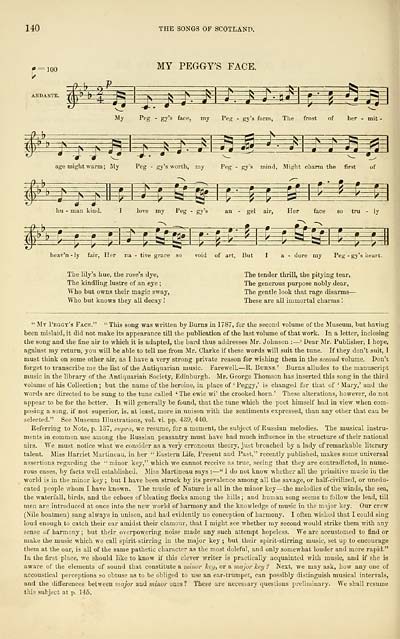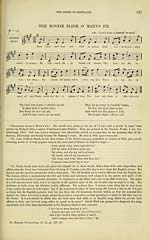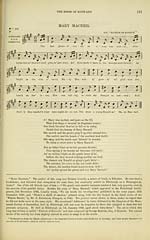Glen Collection of printed music > Printed music > Wood's edition of the songs of Scotland
(164) Page 140 - My Peggy's face
Download files
Complete book:
Individual page:
Thumbnail gallery: Grid view | List view

140
THE SONGS OF SCOTLAND.
• = 100
MY PEGGY'S FACE.
r.P 9
H-4-
fc^El^z
^ N V
^M=T=Hj^
My
i^s^^^s^^^i
Peg - gy's face, my Peg - gy's form, The frost of her - unit ■
EE
S
-P
^z^t
m
i^=*
*-*"
age might warm; My Peg - gy's worth, my Peg - gy's mind, Might charm the first of
£^EEpE|
^p3
E
J > t
hu - man kind.
I love my Peg - gy's an - gel air, Her face so tru - ly
*^fep=
SeIe
n=£
Pl£g
£=£
&
heav'n - ly fair, Her na - tive grace so void of art, But I a - dore my Peg - gy's heart.
The lily's hue, the rose's dye,
The kindliug lustre of an eye ;
Who but owns their magic sway,
Who but knows they all decay !
The tender thrill, the pitying tear,
The generous purpose nobly dear,
The gentle look that rage disarms—
These are all immortal charms !
" My Peggy's Face." " This song was written by Burns in 1787, for the second volume of the Museum, but having
been mislaid, it did not make its appearance till the publication of the last volume of that work. In a letter, inclosing
the song and the fine air to which it is adapted, the bard thus addresses Mr. Johnson : — ' Dear Mr. Publisher, I hope,
against my return, you will be able to tell me from Mr. Clarke if these words will svdt the tune. If they don't suit, I
must think on some other air, as I have a very strong private reason for wishing them in the second volume. Don't
forget to transcribe me the list of the Antiquarian music. Farewell. — R. Bcrns.' Burns alludes to the manuscript
music in the library of the Antiquarian Society, Edinburgh. Mr. George Thomson has inserted this song in the third
volume of his Collection ; but the name of the heroine, iu place of ' Peggy,' is changed for that of ' Mary,' and the
words are directed to be sung to the tune called ' The ewie wi' the crooked horn.' These alterations, however, do not
appear to be for the better. It will generally be found, that the tune which the poet himself had in view when com-
posing a song, if not superior, is, at least, more in unison with the sentiments expressed, than any other that cau be
selected." See Museum Illustrations, vol. vi. pp. 439, 440.
Referring to Note, p. 137, supra, we resume, for a moment, the subject of Russian melodies. The musical instru-
ments in common use among the Russian peasantry must have had much influence in the structure of their national
airs. We must notice what we consider as a very erroneous theory, just broached by a lady of remarkable literary
talent. Miss Harriet Mavtineau, in her " Eastern Life, Present and Past," recently published, makes some universal
assertions regarding the " minor key," which we cannot receive as true, seeing that they are contradicted, in nume-
rous cases, by facts well established. Miss Martineau says : — " I do not know whether all the primitive music iu the
world is in the minor key ; but I have been struck by its prevalence among all the savage, or half-civilized, or unedu-
cated people whom I have known. The music of Nature is all in the minor key — the melodies of the winds, the sea,
the waterfall, birds, and the echoes of bleating flocks among the hills; and human song seems to follow the lead, till
men are introduced at once into the new world of harmony and the knowledge of music in the major key. Our crew
(Nile boatmen) sang always in unison, and had evidently no conception of harmony. I often wished that I could sing
loud enough to catch their ear amidst their clamour, that I might see whether my second would strike them with any
sense of harmony ; but their overpowering noise made any such attempt hopeless. We are accustomed to find or
make the music which we call spirit-stirring in the major key ; but their spirit-stirring music, set up to encourage
them at the oar, is all of the same pathetic character as the most doleful, and only somewhat louder and more rapid."
In the first place, we should like to know if this clever writer is practically acquainted with music, and if she is
aware of the elements of sound that constitute a minor key, or a major hey ? Nest, we may ask, how any one of
accoustical perceptions so obtuse as to be obliged to use an ear-trumpet, can possibly distinguish musical intervals,
and the differences between major and minor ones ? These are necessary questions preliminary. We shall resume
this subject at p. 145.
THE SONGS OF SCOTLAND.
• = 100
MY PEGGY'S FACE.
r.P 9
H-4-
fc^El^z
^ N V
^M=T=Hj^
My
i^s^^^s^^^i
Peg - gy's face, my Peg - gy's form, The frost of her - unit ■
EE
S
-P
^z^t
m
i^=*
*-*"
age might warm; My Peg - gy's worth, my Peg - gy's mind, Might charm the first of
£^EEpE|
^p3
E
J > t
hu - man kind.
I love my Peg - gy's an - gel air, Her face so tru - ly
*^fep=
SeIe
n=£
Pl£g
£=£
&
heav'n - ly fair, Her na - tive grace so void of art, But I a - dore my Peg - gy's heart.
The lily's hue, the rose's dye,
The kindliug lustre of an eye ;
Who but owns their magic sway,
Who but knows they all decay !
The tender thrill, the pitying tear,
The generous purpose nobly dear,
The gentle look that rage disarms—
These are all immortal charms !
" My Peggy's Face." " This song was written by Burns in 1787, for the second volume of the Museum, but having
been mislaid, it did not make its appearance till the publication of the last volume of that work. In a letter, inclosing
the song and the fine air to which it is adapted, the bard thus addresses Mr. Johnson : — ' Dear Mr. Publisher, I hope,
against my return, you will be able to tell me from Mr. Clarke if these words will svdt the tune. If they don't suit, I
must think on some other air, as I have a very strong private reason for wishing them in the second volume. Don't
forget to transcribe me the list of the Antiquarian music. Farewell. — R. Bcrns.' Burns alludes to the manuscript
music in the library of the Antiquarian Society, Edinburgh. Mr. George Thomson has inserted this song in the third
volume of his Collection ; but the name of the heroine, iu place of ' Peggy,' is changed for that of ' Mary,' and the
words are directed to be sung to the tune called ' The ewie wi' the crooked horn.' These alterations, however, do not
appear to be for the better. It will generally be found, that the tune which the poet himself had in view when com-
posing a song, if not superior, is, at least, more in unison with the sentiments expressed, than any other that cau be
selected." See Museum Illustrations, vol. vi. pp. 439, 440.
Referring to Note, p. 137, supra, we resume, for a moment, the subject of Russian melodies. The musical instru-
ments in common use among the Russian peasantry must have had much influence in the structure of their national
airs. We must notice what we consider as a very erroneous theory, just broached by a lady of remarkable literary
talent. Miss Harriet Mavtineau, in her " Eastern Life, Present and Past," recently published, makes some universal
assertions regarding the " minor key," which we cannot receive as true, seeing that they are contradicted, in nume-
rous cases, by facts well established. Miss Martineau says : — " I do not know whether all the primitive music iu the
world is in the minor key ; but I have been struck by its prevalence among all the savage, or half-civilized, or unedu-
cated people whom I have known. The music of Nature is all in the minor key — the melodies of the winds, the sea,
the waterfall, birds, and the echoes of bleating flocks among the hills; and human song seems to follow the lead, till
men are introduced at once into the new world of harmony and the knowledge of music in the major key. Our crew
(Nile boatmen) sang always in unison, and had evidently no conception of harmony. I often wished that I could sing
loud enough to catch their ear amidst their clamour, that I might see whether my second would strike them with any
sense of harmony ; but their overpowering noise made any such attempt hopeless. We are accustomed to find or
make the music which we call spirit-stirring in the major key ; but their spirit-stirring music, set up to encourage
them at the oar, is all of the same pathetic character as the most doleful, and only somewhat louder and more rapid."
In the first place, we should like to know if this clever writer is practically acquainted with music, and if she is
aware of the elements of sound that constitute a minor key, or a major hey ? Nest, we may ask, how any one of
accoustical perceptions so obtuse as to be obliged to use an ear-trumpet, can possibly distinguish musical intervals,
and the differences between major and minor ones ? These are necessary questions preliminary. We shall resume
this subject at p. 145.
Set display mode to: Large image | Transcription
Images and transcriptions on this page, including medium image downloads, may be used under the Creative Commons Attribution 4.0 International Licence unless otherwise stated. ![]()
| Special collections of printed music > Glen Collection of printed music > Printed music > Wood's edition of the songs of Scotland > (164) Page 140 - My Peggy's face |
|---|
| Permanent URL | https://digital.nls.uk/91339711 |
|---|
| Description | Scottish songs and music of the 18th and early 19th centuries, including music for the Highland bagpipe. These are selected items from the collection of John Glen (1833 to 1904). Also includes a few manuscripts, some treatises, and other books on the subject. |
|---|
| Description | The Glen Collection and the Inglis Collection represent mainly 18th and 19th century Scottish music, including Scottish songs. The collections of Berlioz and Verdi collected by bibliographer Cecil Hopkinson contain contemporary and later editions of the works of the two composers Berlioz and Verdi. |
|---|

